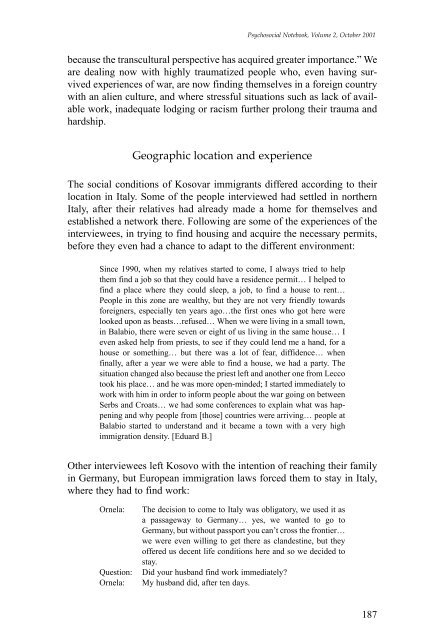Psychosocial Notebook - IOM Publications - International ...
Psychosocial Notebook - IOM Publications - International ...
Psychosocial Notebook - IOM Publications - International ...
You also want an ePaper? Increase the reach of your titles
YUMPU automatically turns print PDFs into web optimized ePapers that Google loves.
<strong>Psychosocial</strong> <strong>Notebook</strong>, Volume 2, October 2001<br />
because the transcultural perspective has acquired greater importance.” We<br />
are dealing now with highly traumatized people who, even having survived<br />
experiences of war, are now finding themselves in a foreign country<br />
with an alien culture, and where stressful situations such as lack of available<br />
work, inadequate lodging or racism further prolong their trauma and<br />
hardship.<br />
Geographic location and experience<br />
The social conditions of Kosovar immigrants differed according to their<br />
location in Italy. Some of the people interviewed had settled in northern<br />
Italy, after their relatives had already made a home for themselves and<br />
established a network there. Following are some of the experiences of the<br />
interviewees, in trying to find housing and acquire the necessary permits,<br />
before they even had a chance to adapt to the different environment:<br />
Since 1990, when my relatives started to come, I always tried to help<br />
them find a job so that they could have a residence permit… I helped to<br />
find a place where they could sleep, a job, to find a house to rent…<br />
People in this zone are wealthy, but they are not very friendly towards<br />
foreigners, especially ten years ago…the first ones who got here were<br />
looked upon as beasts…refused… When we were living in a small town,<br />
in Balabio, there were seven or eight of us living in the same house… I<br />
even asked help from priests, to see if they could lend me a hand, for a<br />
house or something… but there was a lot of fear, diffidence… when<br />
finally, after a year we were able to find a house, we had a party. The<br />
situation changed also because the priest left and another one from Lecco<br />
took his place… and he was more open-minded; I started immediately to<br />
work with him in order to inform people about the war going on between<br />
Serbs and Croats… we had some conferences to explain what was happening<br />
and why people from [those] countries were arriving… people at<br />
Balabio started to understand and it became a town with a very high<br />
immigration density. [Eduard B.]<br />
Other interviewees left Kosovo with the intention of reaching their family<br />
in Germany, but European immigration laws forced them to stay in Italy,<br />
where they had to find work:<br />
Ornela: The decision to come to Italy was obligatory, we used it as<br />
a passageway to Germany… yes, we wanted to go to<br />
Germany, but without passport you can’t cross the frontier…<br />
we were even willing to get there as clandestine, but they<br />
offered us decent life conditions here and so we decided to<br />
stay.<br />
Question: Did your husband find work immediately?<br />
Ornela: My husband did, after ten days.<br />
187

















